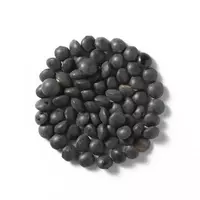Black lentils

Such a plant as lentils, people began to eat and cultivate several millennia ago. Lentils or Lens belongs to the herbaceous genus of plants from the legume family, which grow in the Transcaucasus, Central and Asia Minor, and in addition in the Mediterranean region. Scientists distinguish one main species of plant Lentils food Lens culinaris.
Over the centuries-old history of lentils, breeders have been able to breed several subspecies of the plant, which are usually distinguished by color, vitamin-mineral composition, as well as taste and consumer characteristics. Lentils, as well as beans or peas, are classified as legumes. Researchers claim that lentils are ahead of all their closest "legume" relatives in terms of their useful properties.
One of the popular species of the plant is black lentils, the properties of which are also important and bring invaluable benefits to all of humanity. The chemical composition of black lentils contains a large amount of easily digestible protein of natural origin. In addition, the distinctive beneficial properties of black lentils are explained by the presence in the chemical composition of the plant of vitamins of groups A, B, C, as well as such biologically active components as phosphorus, iron, zinc, potassium, calcium and magnesium.
The benefits of black lentils
The benefits of black lentils are due to the content of a large amount of fiber in the plant, which in turn plays an important role in the digestive processes of the human body. It is worth emphasizing especially the fact that black lentils belong to those species of plants that do not accumulate nitrates, toxins or radionuclides during their life cycle.
This means that you can fearlessly eat a plant, and in addition, get invaluable benefits of black lentils without thinking about possible negative consequences. Although the calorie content of black lentils is at a fairly high level and is 322 Kcal per 100 grams, the plant belongs to dietary foods.
This is primarily due to the fact that the basis of the nutrient composition of the plant is formed by proteins and carbohydrates, which are quickly and easily absorbed by the human body. In addition to the dietary nutrition menu, black lentils are used as a medicinal product. Studies have shown that eating black lentils regularly helps in the treatment of cardiovascular diseases, diabetes, as well as problems associated with the gastrointestinal tract.
Black lentils have antioxidant properties that help to remove harmful compounds accumulated in the process of vital activity. Recent scientific studies have confirmed the fact that black lentils contribute to the prevention of cancer. Sprouted black lentils help cure hypertension, liver disease, as well as metabolic disorders. Black lentils will increase the body's immunity, as well as help with chronic fatigue syndrome and stress.
black lentils 322 kCal
Energy value of black lentils (Ratio of proteins, fats, carbohydrates - ju):
Proteins: 25 g (~ 100 kCal)
Fats: 1.1 g (~ 10 kCal)
Carbohydrates: 53g (~ 212 kCal)
Energy ratio (bj | y): 31% | 3% | 66%
 Español
Español Français
Français Português
Português Русский
Русский 简体中文
简体中文 繁體中文
繁體中文 日本語
日本語 한국어
한국어 العربية
العربية Türkçe
Türkçe Қазақ
Қазақ Deutsch
Deutsch Italiano
Italiano Українська
Українська
